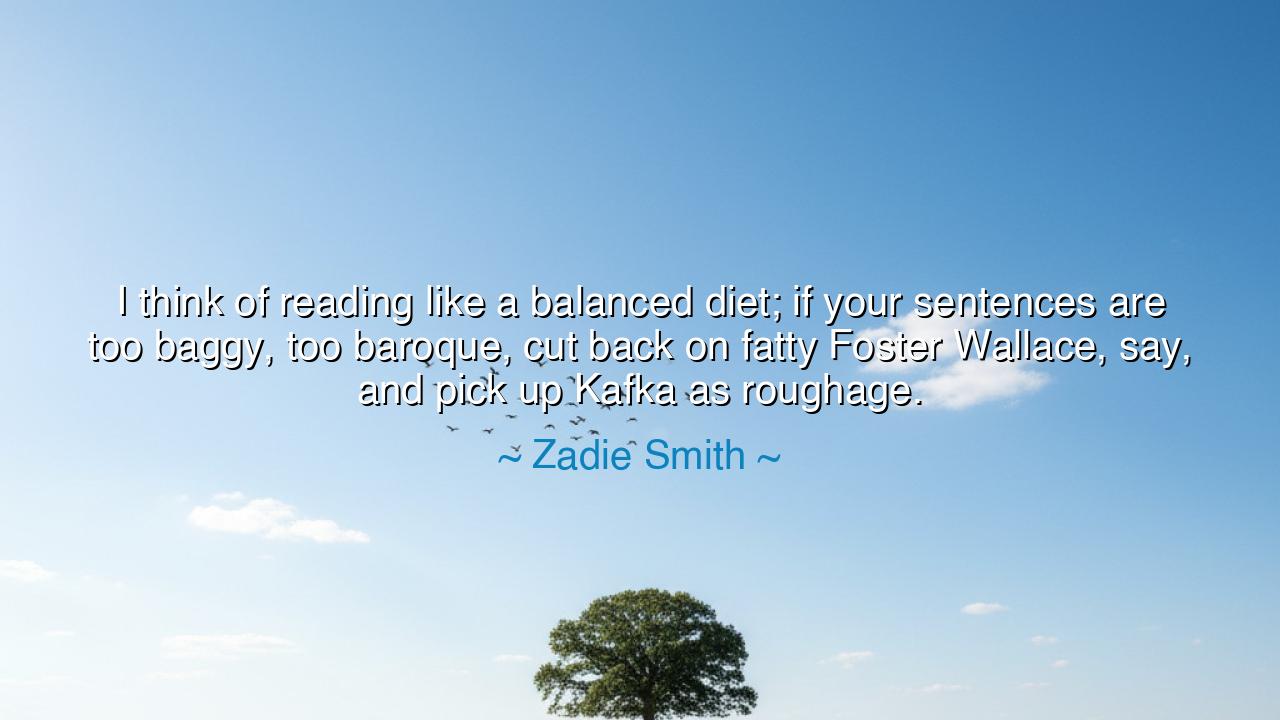
I think of reading like a balanced diet; if your sentences are
I think of reading like a balanced diet; if your sentences are too baggy, too baroque, cut back on fatty Foster Wallace, say, and pick up Kafka as roughage.






"I think of reading like a balanced diet; if your sentences are too baggy, too baroque, cut back on fatty Foster Wallace, say, and pick up Kafka as roughage." These words, spoken by Zadie Smith, strike at the heart of how we approach the food for our minds—the literature we consume. Much like a balanced diet, where we select foods that nourish us and avoid those that weigh us down, Smith draws a parallel between the quality of our reading material and the balance needed to sustain both intellectual and emotional health. She urges us to be mindful of the nourishment we feed our minds, to consider the variety of voices, the substance of ideas, and the clarity of expression that form the foundation of our intellectual well-being.
In ancient times, the wise men and women understood that the mind, like the body, requires a balanced diet. The philosopher Plato, in his dialogues, often spoke of the importance of balance in all aspects of life, including education and learning. Just as the body requires a mix of different foods—proteins, fats, and roughage—the mind, too, must be exposed to a variety of ideas and styles of thinking. For Plato, the mind is a garden that must be carefully tended, with different types of wisdom serving as the nutrients that allow the soul to flourish. Smith’s analogy speaks to this very ancient principle: that literature must serve both the mind and the spirit, providing nourishment that supports our intellectual growth while not overwhelming us.
Consider the ancient Greeks, who understood the power of stories and rhetoric in shaping society and shaping individuals. Aristotle, in his work on poetics, argued that the most effective narratives and ideas are those that strike a balance between complexity and clarity. In his view, literature and art should not be overly convoluted or obscure, but instead should aim for a harmony between depth and simplicity. This is precisely what Smith is advocating in her quote: that too much of baroque, overly ornate prose—like the rich, dense sentences of David Foster Wallace—can weigh the reader down, much as an excess of rich, fatty foods can burden the body. On the other hand, reading Kafka, with his directness and clarity, is akin to consuming the roughage that helps to cleanse the mind and allow it to function at its best.
The great Roman orators like Cicero and Quintilian also understood the power of balance in language. Cicero, whose speeches were renowned for their clarity and persuasive power, knew that language could be both elegant and concise—something that stirred the emotions of the listener without clouding the message. Quintilian, in his treatise on rhetoric, taught that a good orator should avoid overindulgence in complexity, favoring instead simplicity and precision. The ancient orators would likely have approved of Smith’s notion that we must be discerning in our consumption of literature, choosing works that bring us clarity and understanding, while avoiding those that overwhelm us with excessive elaboration or excessive indulgence.
Smith’s metaphor extends to the way we consume not just words, but ideas. The minds of the ancient philosophers were trained to focus on the clarity and strength of ideas, not on the elaborateness of their expression. The philosopher Aristotle, in his work on ethics, discussed the importance of moderation in all things, arguing that excess in any area of life—whether it be food, wealth, or even intellectual pursuits—can lead to imbalance. Too much complexity in our reading material, much like too much fatty food in our diet, can confuse us rather than clarify our understanding. Smith’s words remind us that a balanced diet of literature, one that offers both complexity and simplicity in turn, ensures that we develop broad, clear thinking.
The deeper lesson in Smith’s words is about mindful consumption—choosing what to read, what to learn, and how to approach ideas with balance. Just as we must be thoughtful about the food we eat to nourish our bodies, so must we be mindful of the words and ideas we allow to nourish our minds. In practical terms, this means diversifying the types of literature we read, not getting stuck in a single genre or style of writing. It means challenging ourselves with difficult texts, but also giving ourselves space for more direct and accessible works that clear the mental clutter. By doing so, we create a mind that is sharp, healthy, and full of vitality.
Therefore, let us take Zadie Smith’s wisdom to heart and approach our intellectual nourishment as we would our physical diet—thoughtfully and with awareness. Let us read with balance, indulging in complex, challenging works when we are prepared to engage with them, but also balancing them with simpler, clearer works that provide us with intellectual roughage. In this way, we cultivate minds that are not only deep but also clear, capable of holding complex thoughts without being overwhelmed by them. As the ancient philosophers taught, we must strive for moderation, in both the food we consume and the ideas we ingest, for in this balance lies the path to wisdom, health, and lasting fulfillment.






AAdministratorAdministrator
Welcome, honored guests. Please leave a comment, we will respond soon